Politics
Cyprus split, Turks united on anniversary of peace operation
The Turkish Republic of Northern Cyprus (TRNC) on Sunday marked the anniversary of the July 20, 1974 Cyprus Peace Operation by Türkiye, a turning point in the history of the Mediterranean island, which is divided between Greek and Turkish Cypriots.
The operation was a display of Türkiye’s unwavering support for the community whose future state is fully recognized only by Ankara. President Recep Tayyip Erdoğan was scheduled to fly to the TRNC to attend ceremonies marking the anniversary.
The operation helped Turkish Cypriots stave off a grim future and paved the way for the establishment of their state in its current form. Fifty-one years on, the operation is an occasion celebrated through military parades and ceremonies and dedicated to those who died in atrocities committed by Greek Cypriot gangs.
Along with attending anniversary ceremonies, Erdoğan is expected to showcase Türkiye’s concrete steps to support the TRNC, including a groundbreaking ceremony for a new hospital supported by the Turkish Ministry of Health and the inauguration of new roads in the city.
The anniversary comes a few days after TRNC President Ersin Tatar and Greek Cypriot leader Nikos Christodoulides met in New York at U.N. headquarters for informal talks on the future of the divided island. They were accompanied by U.N. Secretary-General Antonio Guterres and representatives of the guarantor powers, Türkiye, Greece and the United Kingdom. Talks, held for the second time this year, did not yield any concrete results, but the two sides agreed on confidence-building measures.
Greek Cypriots advocate for the reunification of the island with a bi-communal administrative system, while the TRNC insists on a two-state solution where it will be recognized as a sovereign state.
In the second half of the 20th century, Cyprus was the scene of Greek efforts to erase Turkish Cypriot existence on the island. Fearing a Greek Cypriot plot to unite with Greece, which would ultimately put Turkish Cypriots under the control of Greek Cypriot dominance, Türkiye launched the Cyprus Peace Operation in the summer of 1974.
Cyprus was once an Ottoman island before it was handed over to a British mandate in 1923. Greek Cypriots, encouraged by the Greek uprising against Ottoman rule in 1821, have long aspired for reunification with Greece. In 1955, they took the first steps to achieve this by the establishment of the terrorist group EOKA. EOKA’s campaign of violence targeted Turkish Cypriots, as well as Greek Cypriots opposing their goal of reunification. Turkish Cypriots took up arms in 1958, establishing a resistance organization known as the Turkish Resistance Organization (TMT). Rising tensions on the island appeared to die down in 1960 with the establishment of the Republic of Cyprus. Yet, three years later, Greek Cypriots moved to amend the constitution to deprive Turkish Cypriots of their rights. Armed attacks against the Turkish Cypriot community exacerbated tensions again, effectively putting an end to the bi-national republic. Assaults on Turkish Cypriots in 1963 evolved into an all-out attack by Greek Cypriot forces on Erenköy, a line of resistance by Turkish Cypriots, in 1964. The civilian population was bombed by Greek warplanes, prompting Türkiye to launch a limited air offensive to stave off Greek attacks.
Ten years later, Türkiye took the initiative for a lasting solution to attacks targeting Turkish Cypriots and launched the Cyprus Peace Operation. The operation led to a cease-fire two days later, but ongoing hostilities prompted Türkiye to launch the second stage of the operation on Aug. 14, 1974. The operations cost the lives of 498 Turkish soldiers and 786 Turkish Cypriot “mücahits,” members of paramilitary groups resisting Greek Cypriot attacks. The operation ensured a cessation of attacks by Greek Cypriots, and one year later, Turkish Cypriots declared the Turkish Federated State of Cyprus, under the leadership of Rauf Denktaş, a co-founder of TMT. The state renamed the TRNC in 1983.
The TRNC, however, faced major setbacks as it was not recognized globally and faced economic and political embargoes. It also sought to reconcile with Greek Cypriots, and the two sides agreed upon a series of talks in the early 2000s. Yet, after the Greek Cypriot administration was admitted to the European Union in 2004, efforts collapsed. The last round of concrete talks to end the division failed in 2017.
Under the leadership of President Erdoğan, Türkiye continues to implement policies that provide full support to Turkish Cypriots, although at times it has fallen out with Turkish Cypriot administrations, which have warmed up to the idea of a bi-communal federation. Under Tatar, who came to power in 2020, the TRNC realigned with Ankara and adopted a no-concession policy in talks over the island’s status.
The TRNC will continue to build its future, Tatar said on Friday after the informal talks in New York, underlining that “there are two states” on the Eastern Mediterranean island.
“The existence of these two states has been a reality for 62 years. A solution based on the sovereignty of both peoples in Cyprus is possible,” Tatar told reporters. Tatar said progress could be achieved in Cyprus “through cooperation between the two separate states. We are not avoiding dialogue, but we insist on sovereign equality.”
He noted that the informal meeting did not constitute official negotiations, nor did it indicate a move in that direction, adding that their presence in New York was for cooperation, rather than formal talks. Tatar criticized the EU for appointing a special envoy on Cyprus without consulting the Turkish Cypriot side. He said the bloc holds a biased stance and reaffirmed that Turkish Cypriots would only accept EU involvement if their sovereignty is recognized. “Otherwise, such representation is unacceptable,” he said.
He added that they had met their obligations regarding matters related to the cooperation agreed upon in Geneva (during a meeting last March) and New York with the Greek Cypriot administration, but said no consensus was reached on opening new border crossings due to the Greek Cypriot side’s stance.
Tatar described the Greek Cypriot side’s legal actions against individuals investing in properties in the TRNC as a violation of international law and human rights, calling it an attack that is incompatible with goodwill. He also emphasized that all negotiation processes were being conducted in consultation with Türkiye. Since last year, the Greek Cypriot administration has been pursuing legal action and arrests targeting individuals who purchased property in the TRNC. TRNC officials argue that the true aim behind these actions is to undermine the construction sector and the broader economy. On Sunday, four individuals identified as citizens of the Greek Cypriot administration were detained by police while conducting land surveys and assessments in the TRNC, according to security sources. The suspects were caught by security forces near the town of Iskele while surveying land, police sources said. The suspects were allegedly collecting documents and conducting assessments as part of the Greek Cypriot administration’s ongoing efforts to identify and prosecute those acquiring property in the TRNC. The four detainees are expected to appear in court, while authorities investigate their possible ties to the Greek Cypriot administration’s intelligence agency and determine who may have directed their actions.
Taking root
Today, the peace operation is a source of pride for Turkish Cypriots, while Greek Cypriots mark the same day as a day of mourning for those killed in clashes with Turkish and Turkish Cypriot forces. Greek Cypriot President Christoulides said in a ceremony on Sunday that they would “never yield an inch of land,” while he described the ceremonies in the TRNC as “shameful.”
TRNC Parliament Speaker Ziya Öztürkler said that Greek Cypriots never gave up the idea of annexation with Greece and through the Peace Operation, Turkish Cypriots started taking root in the island. The day is officially known as July 20 Peace and Freedom Day in the TRNC. Öztürkler told Anadolu Agency (AA) on Sunday that the TRNC has made significant progress since the operation, particularly in establishing institutions for infrastructure, education and health care, as well as in “standing for our lands.”
“The flags of the TRNC and the mainland Republic of Türkiye will fly together forever here,” Öztürkler said.
The speaker noted that, thanks to the efforts of Erdoğan, Turkish Vice President Cevdet Yılmaz and Parliament Speaker Numan Kurtulmuş, the TRNC had raised its profile internationally and particularly enhanced relations with the Turkic states.
“The peace operation means independence and freedom for Turkish Cypriots. This is the anniversary of a day where Turkish Cypriots built a freedom epic together with their homeland, Türkiye,” he said. Öztürkler said they fondly remembered the Turkish politicians behind the operation, including then-Prime Minister Bülent Ecevit and Deputy Prime Minister Necmettin Erbakan.
Before his flight to the TRNC, President Erdoğan issued a message on his social media account to celebrate the anniversary and said he wholeheartedly congratulated the Turkish Cypriot people.
“On the 51st anniversary of the Cyprus Peace Operation, I remember with respect our martyrs who gave their lives for the Turkish Cypriot people’s struggle for existence, and I offer my gratitude to our heroic veterans,” Erdoğan said.
One of those veterans is a 75-year-old Cuma Erdem. Erdem was a conscript in the southern Turkish province of Kahramanmaraş when he was deployed to Cyprus for both stages of the operation. He and others boarded a passenger ship to reach the island in the 1974 summer. The ship was among 33 others carrying Turkish troops and came under Greek Cypriot fire when they approached the coast. Erdem and fellow troops crossed the Beşparmak mountains to reach Lefkoşa, with sporadic clashes with Greek Cypriot forces. Along the way, he witnessed fellow troops mowed down by gunfire, and his unit persisted in its march. “On the other side, Greek Cypriot troops started running when we advanced further,” he told AA on Sunday. “We came across Greek Cypriot soldiers tied to their machine guns by their commanders so that they would not flee,” he recounted.
In the second operation, Erdem says he witnessed the aftermath of atrocities committed by Greek Cypriots. He recalls raids by Greek Cypriots on Turkish Cypriot villages, Muratağa, Sandallar and Atlılar. “We heard that they were indiscriminately killing people in an execution style. In one village, we discovered a fresh trail of blood and followed it. We found half-buried bodies of martyrs there. I still remember those moments,” Erdem said.
Cevdet Kürtdur was deployed in a tank unit during the operation. He survived attacks by Greek Cypriots but still bears their scars, including a partial hearing loss. Kürtdur, who was injured when gunfire hit his tank, says he was “honored” to be a veteran. “If they call me again (for deployment), I would go,” he proudly says.
Hasan Aslan, a Turkish army veteran, experiences a mix of joy and grief while remembering the peace operation. Seventy-one-year-old Aslan was among 128 soldiers taking on a well-armed Greek Cypriot regiment. “When the dawn broke on July 20, Turkish reconnaissance planes hovered above us, and then came a barrage of bullets. At one point, we ran out of ammo, and then, paratroopers came to our aid,” Aslan told AA.
One of those paratroopers who landed in the spot he was deployed turned out to be a compatriot. “Bullets were grazing us, but I remember hugging him when I found out that he was from a village neighboring mine in Türkiye. I asked him about the situation in Türkiye, and he told me that people were mobilized and donating to the Turkish army.”
“I am happy to make a small contribution to Cyprus. We showed the world that Turkish Cypriots had the right to exist, and eventually, they managed to establish the TRNC,” he said.
Politics
Activists in Türkiye to back multinational Gaza-bound aid flotilla
Activists and civil society groups in Türkiye announced Wednesday they will support the Global Resolve Flotilla, a multinational effort preparing to sail for the Gaza Strip in a bid to break Israel’s blockade, which has worsened humanitarian conditions in the enclave.
The flotilla, which will set sail from Spain on Aug. 31 and from Tunisia on Sept. 4, aims to deliver humanitarian aid directly to Gaza, raise global awareness of the Palestinian plight and spotlight what organizers call Israel’s “systematic genocide.”
At a news conference hosted by the Ummah Movement Association, Turkish delegation spokesperson Hüseyin Durmaz said that the initiative unites more than 40 countries from Europe, Africa, Asia, Latin America and the Arab world.
“Preparations are underway for volunteers and activists from diverse backgrounds to join this mission from Türkiye,” Durmaz said. “This is not limited to local efforts; it has become a global solidarity movement with support pouring in from around the world.”
The civilian-led mission will carry food packages, baby formula, medical supplies and other essential goods. Organizers say the effort is entirely peaceful and non-violent. More than 6,000 activists from 44 countries have already registered online to participate in the event.
Durmaz stressed that the flotilla’s multinational composition underscores its independence and grassroots nature.
“This is a concrete step toward sustaining the momentum of global movements, effectively challenging the blockade on Gaza and strengthening solidarity among peoples,” he said.
Israel’s blockade of Gaza, imposed since 2007, has been condemned by Türkiye and many in the international community as a form of collective punishment. The restrictions have severely limited humanitarian access, contributing to widespread shortages and famine-like conditions in the besieged Palestinian territory.
The Global Resolve Flotilla is the latest in a series of international maritime missions challenging the blockade, echoing previous attempts that drew global attention to the humanitarian crisis in Gaza.
It follows days after Israeli naval forces intercepted the Handala aid ship on July 26 as it neared Gaza, escorting it to Ashdod Port.
Rejecting repeated calls for a cease-fire, Israel has continued its military assault on Gaza since Oct. 7, 2023, killing nearly 61,000 Palestinians, almost half of them women and children and devastating the enclave’s infrastructure.
The International Criminal Court (ICC) in November issued arrest warrants for Israeli Prime Minister Benjamin Netanyahu and former Defense Minister Yoav Gallant for war crimes and crimes against humanity. Israel also faces a genocide case at the International Court of Justice (ICJ).
“This is a renewed attempt to pressure governments by sending dozens of ships and thousands of activists to break Gaza’s blockade,” said organizer Seif Abu Keshk at a news conference in Tunis, noting that participants will undergo training and solidarity events at departure points before setting sail.
Politics
Istanbul’s former mayor accused of flying bribe cash to London
Sarp Yalçınkaya, a businessman with close ties to municipal bureaucrats and individuals doing business with the Istanbul Metropolitan Municipality (IBB), disclosed a corruption ring allegedly run by the city’s former mayor, Ekrem Imamoğlu. Yalçınkaya, who invoked a remorse law in exchange for collaborating with authorities, told investigators that the ring collected bribes in a “fund” and Imamoğlu received half of the cash in the fund.
Yalçınkaya stated that the cash collected in the fund was transferred to London aboard private jets and delivered to addresses provided by Imamoğlu, according to a report by the Sabah newspaper.
Imamoğlu and dozens of other suspects, including bureaucrats of IBB and businesspeople, were detained last March in a major graft probe. More operations followed and Yalçınkaya was arrested in the fourth wave of operations against the corruption network at the municipality. Following his arrest, Yalçınkaya said in his initial testimony that Imamoğlu created the fund to take over the main opposition Republican People’s Party (CHP) first and then, for a presidential campaign. The CHP recently nominated Imamoğlu as its future presidential candidate as it pressed on for an early election. Yalçınkaya has claimed that he heard Imamoğlu saying they needed $2 billion (TL 81.34 billion) for the fund.
In his second statement to the investigators, Yalçınkaya explained how people doing business with IBB accumulated wealth thanks to the corruption ring. One of them is Murat Gülibrahimoğlu, a fugitive suspect in the case. Yalçınkaya said Gülibrahimoğlu was a bankrupt businessman when he first met him in 2018, and he became increasingly wealthy after Imamoğlu won his first term as Istanbul mayor in 2019. He said Gülibrahimoğlu was awarded all tenders for excavation works in the city by Imamoğlu and had close ties to Tuncay Yılmaz, manager of Imamoğlu’s construction company and Fatih Keleş, a top IBB bureaucrat. “They often met to discuss bribes they would receive from contractors in exchange for building permits and other permits issued by the municipality. At times, they would extort money by threatening businesspeople by scrapping their permits, though these people complied with all municipal regulations,” he said.
Yalçınkaya said Gülibrahimoğlu was at the heart of the corruption ring, and he rushed to transfer all the cash collected by the ring abroad when the suspects found out a corruption investigation was imminent. “Gülibrahimoğlu also traveled abroad with his private jet in 2022 with Tuncay Yılmaz and Hüseyin Köksal (who was awarded the advertising tender of IBB), and when I asked him the purpose of their visit, he told me that they were carrying cash. He made more trips abroad between 2022 and 2025 and often with IBB officials,” he said.
He said Gülibrahimoğlu told him that all the cash accumulated from bribes and tenders was taken abroad, usually to London. “He told me that half of the cash was transferred to a fund set up for a future presidential campaign, and the other half was allocated to Imamoğlu himself. He also told me that people organizing the transfers were paid 20% of the accumulated cash in exchange for their work.”
“Gülibrahimoğlu told me about a cryptocurrency company they founded and how they transferred cash abroad through cold wallets. He explained that money was being transferred overseas through currency exchange offices with commissions of nearly 1%. Some of the bribes and kickbacks from zoning and licensing were given to these currency exchange offices and then collected back from foreign exchange offices abroad. Additionally, a portion of the funds from permits and zoning fees was transferred abroad via cryptocurrency companies using cold wallets. I heard these details from conversations between Gülibrahimoğlu and Fatih Keleş. Gülibrahimoğlu is well aware of which currency exchange offices collected the money and through which cryptocurrency companies the transfers were made,” he said.
Yalçınkaya told investigators that cash transfers aboard private jets were disguised as gift packages. “Gülibrahimoğlu said each flight carried at least $10 million. I witnessed suitcases full of cash being loaded onto the jet. Bribe money collected from contractors and people fraudulently awarded permits in Istanbul was disguised as earnings from excavation and dumping work, laundered and packaged as gift parcels, and delivered to the addresses Imamoğlu provided abroad. Some of the money is also held in stock markets, cryptocurrency markets and currency exchange offices,” he said. “Some studio apartments across Istanbul are being used as cash storage locations. Murat knows their locations. To avoid the traceability of bribe-tied properties, title deeds are sometimes registered under the names of drivers, relatives, or close associates.”
“A portion of the collected bribes is used to fund the party and municipal expenses. Political rallies are sponsored with collected funds. Maintenance of (CHP’s) main building and district offices, hospitality expenses are all paid from this fund. Social media sponsorships, undisclosed payments to TV channels, numerous media companies and internet portals were also funded through this source. Part of these bribes was used to finance the construction of the CHP building in Istanbul,” Yalçınkaya said.
He added that the primary goal of the fund was to secure control of the CHP and referred to allegations of vote buying during the election of the party’s current chair, Özgür Özel, in November 2023. A separate lawsuit is underway about that election, and testimonies from several former CHP delegates claim that Imamoğlu and people close to Özel offered cash and other benefits to delegates in exchange for their votes to oust Özel’s predecessor, Kemal Kılıçdaroğlu. Yalçınkaya said Imamoğlu and his associates knew that they would need money to buy more votes if the election was to be annulled due to the lawsuit and sought to collect more bribes. “Fatih Keleş was worried when the investigation was launched into (Özel’s election). He told me that they were under too much pressure and had to pay more ‘to support media and columnists’ on their payroll.”
An earlier report by the Sabah newspaper says that Rıza Akpolat, a former mayor of Istanbul’s Beşiktaş district for the CHP who was arrested on corruption charges in January, funded journalists supportive of the CHP. A municipality staff member handed over to prosecutors a list of journalists and others who had been paid a budget of TL 56 million, which Akpolat had accumulated through bribes. The list of journalists allegedly funded by Akpolat includes prominent journalists with direct and indirect links to the CHP, such as Nevşin Mengü, Altan Sancar, Ali Haydar Fırat and Ismail Küçükkaya, as well as pro-CHP TV stations Halk TV and Tele 1. Similar allegations of journalists funded by CHP-run municipalities emerged earlier. Witnesses in the case against Imamoğlu have previously told investigators that Imamoğlu’s close associate, Murat Ongun, personally paid cash to some journalists in secret meetings at parking lots, in exchange for pro-Imamoğlu propaganda. The party’s former chairperson, Kemal Kılıçdaroğlu, in the past, implied that some journalists were funded by Imamoğlu, fueling a debate among journalists who accused each other on social media of receiving payments from municipalities.
Politics
YPG terrorist leader insists on decentralized Syria, name change
Doubling down on the terrorist group’s separatist ambitions, YPG leader Ferhat Abdi Şahin has renewed his calls for a decentralized Syria and the removal of “Arab” from the country’s official name.
In an interview with the Istanbul-based Yeni Yaşam newspaper, Şahin argued that the “Syrian Arab Republic” title, in use since 1961, “does not reflect the reality” of the multiethnic nation and should have the word “Arab” removed.
“Syria does not belong only to Arabs. Such radical changes must be made in Syria,” he said.
“(Syria) cannot be centralized and totalitarian like it was during the Baath regime. It must be a decentralized Syria. All provinces in Syria must be able to govern themselves through local governments,” Şahin claimed.
Just last week, Şahin told local media the YPG “defends the slogan ‘one army, one government, one state,’” echoing Damascus’ calls for full national unity.
The shift in tone comes as the group continues to negotiate with Syria’s interim government over the implementation of a March 10 agreement recognizing Damascus’ sovereignty.
Under the deal, signed by Syrian interim President Ahmed al-Sharaa, the YPG pledged to recognize Damascus’ sovereignty and transfer airports, oil fields and border crossings under its control to the central government by the end of the year.
However, the agreement stops short of outlining how the YPG’s armed wing, the Syrian Democratic Forces (SDF), will be integrated into Syria’s army, a key sticking point. Damascus insists fighters join individually, while the YPG demands entry as a bloc, an issue that threatens to stall the process.
The YPG is the Syrian offshoot of the PKK, which has waged a decadeslong terror campaign in Türkiye and is designated a terrorist group by the United States, the European Union and Türkiye.
With U.S. support under the pretext of fighting Daesh, the YPG seized large swaths of northern and eastern Syria during the civil war. Turkish cross-border operations have since reduced its territorial grip, but it still holds key oil, water and agricultural resources in the northeast.
Washington has recently acknowledged the group’s ties to the PKK, with Tom Barrack, U.S. ambassador to Ankara and special representative for Syria, claiming the U.S. has no obligation to support “the formation of an independent state by the so-called SDF.”
Last month, Barrack also dismissed federalism as a workable model in Syria.
“The problem is that in all these countries (Iraq and Syria), federalism does not work and that a state within a state cannot be established,” Barrack said.
The U.S. envoy has urged Damascus to maintain “one homeland, one nation, one army, one government,” accusing the YPG of being reluctant to fully commit to national unity.
Şahin, however, claimed that a decentralized structure is essential for stability.
“(Barrack) understands that Syria cannot be governed by one person … I hope he has concluded that a decentralized Syria is necessary,” Şahin said.
The YPG’s push for decentralization and symbolic changes, such as altering the country’s name, is widely seen by Türkiye as part of a broader effort to entrench separatist control in Syria’s north.
Ankara has long opposed the YPG’s presence along its border, warning it will “intervene” if the group does not comply with the March 10 deal and disarm as the PKK did.
As part of the landmark terror-free Türkiye initiative, the PKK announced in May it would disband and renounce armed conflict, ending four decades of violence.
Politics
Turkish govt reinstates CHP mayor arrested on corruption charges
Abdurrahman Tutdere, the mayor of the southeastern province of Adıyaman, who was detained last month on corruption charges, was reinstated to his post, the Interior Ministry announced on Tuesday.
Tutdere was suspended from office on July 10 after he was ordered into house arrest following a corruption investigation.
The same investigation has led to detentions of Antalya Mayor Muhittin Böcek and Adana Mayor Zeydan Karalar. All three men are from the main opposition Republican People’s Party (CHP), which is entangled with a series of corruption probes. The CHP’s Istanbul mayor, Ekrem Imamoğlu, was arrested in March on graft charges.
The CHP is under mounting scrutiny as a wave of corruption, bribery and terrorism-related investigations sweeps across its municipalities.
Since late 2024, more than 500 people, including some 15 sitting mayors, have been detained in police operations. Over 200 have been formally arrested, while dozens benefited from the legal provision of “effective remorse” in exchange for cooperation with prosecutors.
Authorities say more than 10 major investigations are underway into municipalities controlled by the main opposition CHP, covering allegations from large-scale tender rigging and bribery to financing terrorist organizations.
The most extensive probe targets the Istanbul Metropolitan Municipality (IBB). Prosecutors allege a network, headed by senior municipal officials, that rigged numerous public contracts. Imamoğlu and his aides deny all charges.
Linked to these allegations is the case of businessperson Aziz Ihsan Aktaş, accused of heading a criminal network that allegedly bribed mayors and senior officials to secure lucrative tenders. Aktaş, initially arrested, was later released after cooperating with authorities under “adequate remorse” provisions.
Two separate investigations in Istanbul focus on alleged links between CHP district municipalities and the PKK terrorist organization. Police operations earlier this year targeted nine CHP-run districts, leading to the arrests of deputy mayors and council members. Prosecutors claim certain local initiatives were used to bolster PKK influence in major cities.
In another high-profile case, dismissed Esenyurt Mayor Ahmet Özer faces trial on charges of PKK membership, while former Sarıyer Mayor Şükrü Genç is accused of financing the DHKP-C terrorist group through municipal channels.
The corruption allegations extend far beyond Türkiye’s largest city, though several of the most prominent cases are centered in Istanbul.
In Istanbul’s European districts, Beşiktaş and Büyükçekmece, officials are accused of bribery, irregular contracting and abuse of office. In the Anatolian districts of Beykoz and Şile, the mayors were arrested on charges of tender rigging, extortion and involvement in organized crime, while Kartal’s mayor and several municipal officials allegedly rented out public properties in violation of the law.
In western Izmir province, the CHP municipality is facing two separate probes: one targeting irregularities in construction projects and another focusing on corruption in a municipal subsidiary, which has already led to the arrest of former Mayor Tunç Soyer.
Politics
Terror-free Türkiye committee adopts working rules in first meeting
Türkiye’s newly formed National Solidarity, Brotherhood and Democracy Commission, led by Parliament Speaker Numan Kurtulmuş, adopted its working procedures and principles Tuesday in its first session at the Turkish Parliament.
During the opening session, representatives of political parties with and without parliamentary groups shared views on the commission’s significance and the process ahead.
The commission unanimously approved its working procedures and principles in the first meeting, adopting the official name National Solidarity, Brotherhood and Democracy Commission.
Its next meeting will take place Aug. 8 at 2 p.m. in the Turkish Parliament’s Ceremony Hall, with Interior Minister Ali Yerlikaya, Defense Minister Yaşar Güler and National Intelligence Organization (MIT) Director Ibrahim Kalın invited to brief the body on their institutions’ work and current developments.
Politics
TRNC president renews call for two-state Cyprus solution
The Turkish Republic of Northern Cyprus (TRNC) President Ersin Tatar reiterated on Tuesday the need for a two-state solution to the Cyprus question, arguing that the Greek Cypriot side has shown “no intention” of achieving a solution.
Tatar reiterated his stance as he received Colin Stewart, the U.N. secretary-general’s Cyprus envoy and head of the U.N. Peacekeeping Force, for a farewell visit as Stewart is stepping down on Saturday.
After the meeting, Tatar thanked Stewart for his service, saying that he had always maintained an open and transparent stance.
In his statement, Tatar referred to the U.N. Security Council’s inclination toward a “two-zone, two-community” federation on the island, saying that no solution had been found in the negotiations held so far and that the Greek Cypriot side has shown no intention of reaching a solution.
“We insist on a two-state solution on Cyprus. The TRNC is a sovereign state in every sense of the word. The decision taken by the U.N. Security Council on Cyprus is outdated and has lost its validity. The region has changed, the status has changed, the Eastern Mediterranean has changed and Türkiye has reached a completely different point,” said Tatar.
Stewart’s farewell
Stewart, whose term as special representative began in 2021 and will end on Saturday, thanked Tatar for having good, productive meetings over the years.
“I know that he deeply cares about Turkish Cypriots and looks after their interests, and he always tried to be constructive about this,” he said.
The island has been split between the Greek and Turkish Cypriot communities since 1974, when a Greek Cypriot coup aimed at Greece’s annexation of the island led to Türkiye’s military intervention as a guarantor power to protect Turkish Cypriots from persecution and violence. As a result, the TRNC was founded in 1983.
Greek Cypriots control the southern part of the island and are recognized by the international community as a state, despite protests from Turkish Cypriots and Türkiye. The TRNC is located in the northern part of the island and is recognized only by Türkiye.
It has seen an on-and-off peace process in recent years, including a failed 2017 initiative in Switzerland under the auspices of guarantor countries Türkiye, Greece and the U.K.
The Greek Cypriot administration entered the EU in 2004, the same year that Greek Cypriots single-handedly blocked a U.N. plan to end the longstanding dispute.
More recently, informal U.N.-led meetings have continued, including one in Geneva in March at the request of Secretary-General Antonio Guterres. That meeting focused on practical cooperation in areas such as crossing points, demining and environmental protection. While progress was made on some issues, others stalled due to the stance of the Greek Cypriot side.
To help advance the process, Maria Angela Holguin Cuellar, the U.N. secretary-general’s personal envoy on Cyprus, was reappointed in May and has since conducted multiple visits and consultations with leaders and officials on the island, Türkiye, Greece, the U.K. and the EU. Despite her efforts, core political disagreements remain unresolved.
-
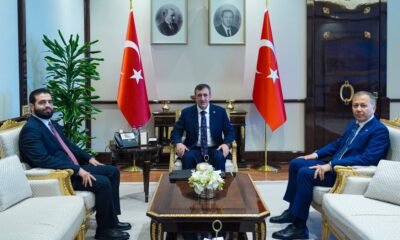
 Politics2 days ago
Politics2 days agoTürkiye, Syria discuss strengthening security cooperation
-
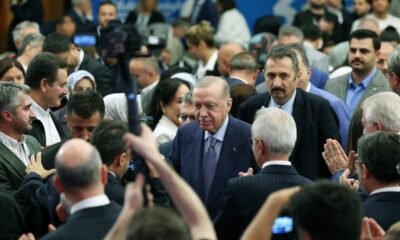
 Politics2 days ago
Politics2 days agoAK Party academy revolutionizes Turkish political training
-
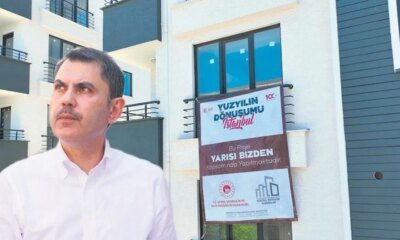
 Daily Agenda2 days ago
Daily Agenda2 days agoHalf of us and hearts are comfortable nests peaceful
-
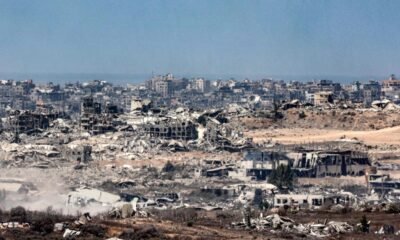
 Economy2 days ago
Economy2 days agoNorway orders review of its wealth fund’s Israel investments
-

 Daily Agenda2 days ago
Daily Agenda2 days agoThe case is over
-
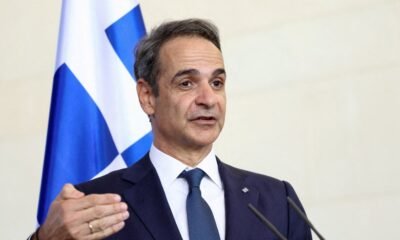
 Politics2 days ago
Politics2 days agoGreece warns Türkiye over EU funds, ties with Athens
-

 Sports3 days ago
Sports3 days agoSon bids adieu in Seoul as Spurs welcome storm with Maddison’s injury
-
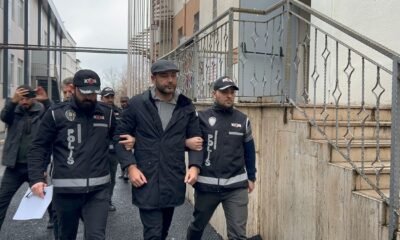
 Politics3 days ago
Politics3 days agoTurkish main opposition mayor reportedly funded journos with bribe cash




